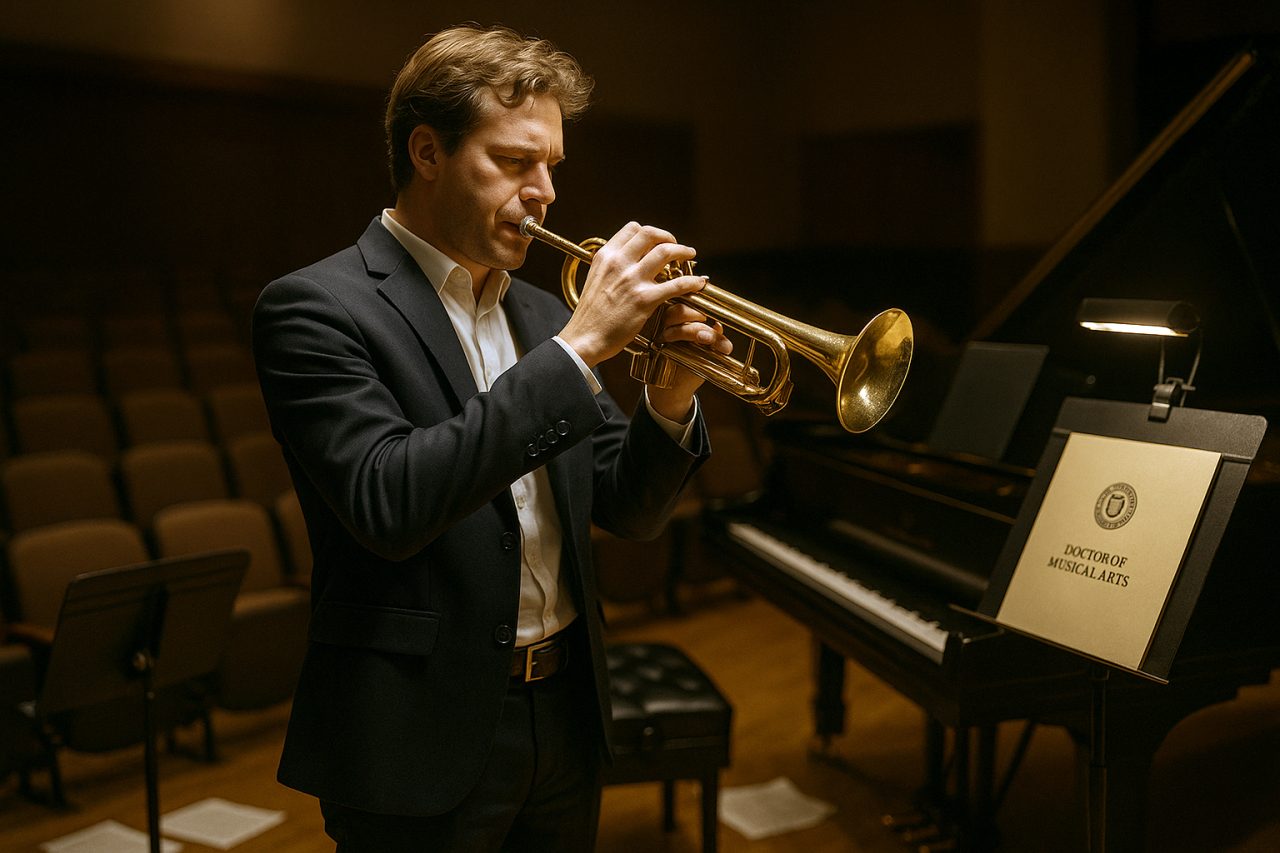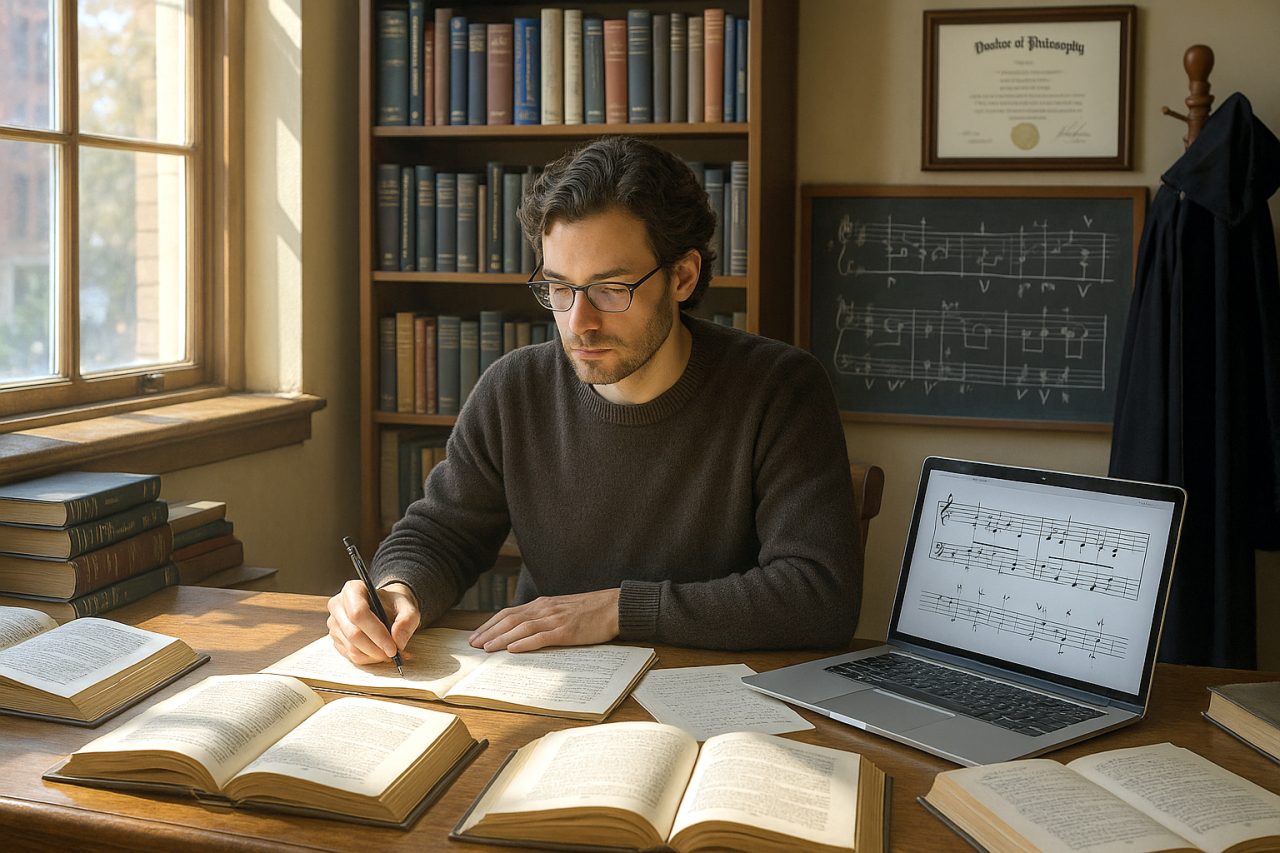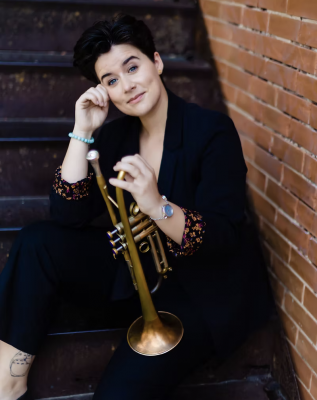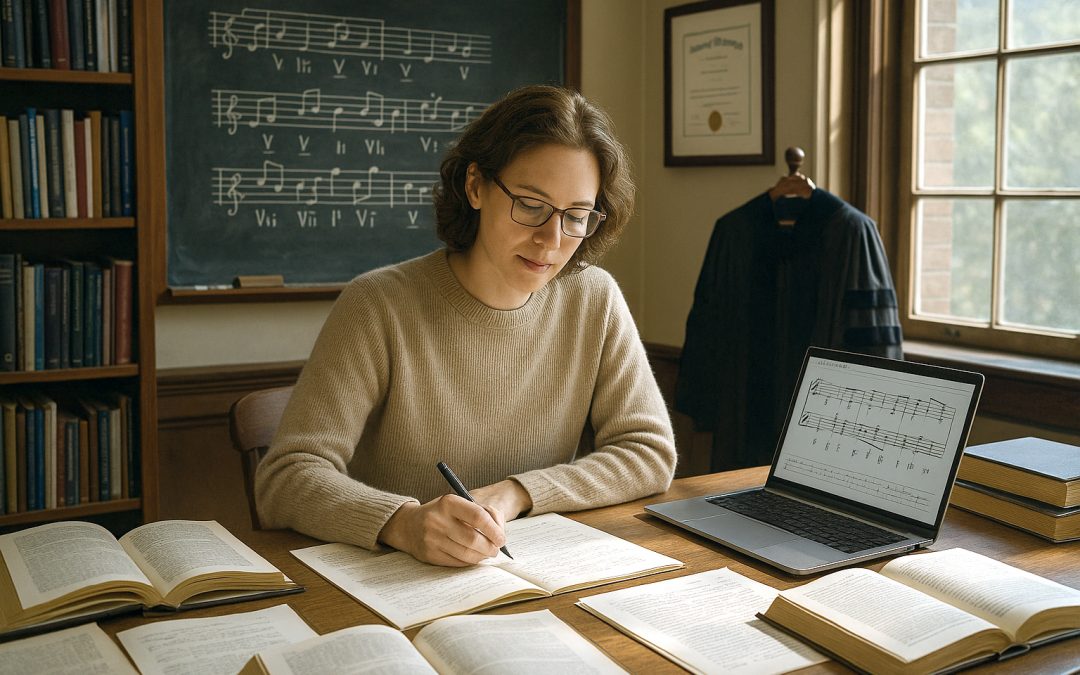A practical guide for musicians on costs, career paths, and what to expect when pursuing a terminal music degree.
As someone who currently holds two master’s degrees, I find myself at that critical crossroads of contemplating whether to continue climbing the educational ladder. For many professional musicians, the idea of pursuing a terminal degree, the final academic credential available in our field, can feel both exciting and daunting. The question is not just whether to pursue a doctorate, but also which type of doctorate best aligns with one’s personal and professional goals. With this article I hope to help you understand the differences, challenges, and career opportunities of terminal degrees in music.
In music, the two primary terminal degrees are the PhD (Doctor of Philosophy in Music) and the DMA (Doctor of Musical Arts). While both are rigorous and respected, they differ in focus, structure, and the kinds of careers they typically prepare you for.
Understanding the Degrees
A PhD in Music is generally centered on research, scholarship, and academic writing. Students in PhD programs might specialize in musicology, ethnomusicology, theory, music education, or another subfield that involves significant research. The PhD is designed for those who enjoy the analytical side of music, delving into archives, writing extensively, and producing original contributions to the field through dissertations and publications.
A DMA, on the other hand, emphasizes performance, conducting, or composition alongside scholarship. Students in DMA programs refine their artistry at the highest level while also engaging in academic study. The culminating project often includes both a written component (such as a document or lecture recital) and a series of performances or creative works that demonstrate mastery.

Questions to Ask Yourself
Before deciding which degree is right for you, I recommend starting with two essential questions:
- What do I want to accomplish after earning the degree?
Do you aspire to a tenure-track university position? A career in research? A life of performing and teaching at the highest level? Each goal points to different degree pathways. - What do I want my day-to-day life to look like during the degree?
If you thrive on research, writing, and engaging deeply with historical or theoretical questions, the PhD may be your best match. If you want your practice room, rehearsal space, or stage to remain at the center of your life, the DMA could be the more fulfilling option.
Career Pathways
This is where the distinction becomes practical.
- With a PhD: Many graduates pursue university teaching positions in musicology, theory, or education. Others find work in publishing, archives, libraries, or research institutes. The PhD is often seen as the more “academic” of the two degrees, and for positions that prioritize research output, it may provide an advantage.
- With a DMA: Graduates often pursue careers as performers, conductors, or composers, frequently combined with academic teaching. Many college and university faculty positions in performance areas now list the DMA as the required terminal degree. The DMA affirms both scholarly ability and artistry, making it especially valuable for those whose professional identity is built around performance.

A Personal Note
For me, the most important factor in considering doctoral study is alignment: aligning the degree with who I am as a musician, who I want to become, and the kind of career and lifestyle I envision after graduation. The decision is less about which degree is “better” and more about which one best supports my long-term goals.
After weighing the differences between the PhD and the DMA, and reflecting on my own professional crossroads, I wanted to provide readers with a perspective from someone who is currently living the DMA experience. I reached out to a colleague — a female jazz trumpet player and DMA candidate — to share her insights.
Meet Trumpeter Rachel Spencer
 Rachel Spencer is proud to join the UT Jazz Department as a TA while pursuing a D.M.A. in jazz trumpet performance where she will serve as the Lead TA for Jazz Appreciation and teach a Jazz Combo. Known for her stylistic prowess and expressive tone, trumpeter Rachel Spencer has had a diverse and fulfilling career. As a performer and educator, her music has afforded her many travel opportunities. Rachel holds a Bachelor of Music in Jazz Studies from Capital University, and a Master of Music in Music and Human Learning from UT Austin.
Rachel Spencer is proud to join the UT Jazz Department as a TA while pursuing a D.M.A. in jazz trumpet performance where she will serve as the Lead TA for Jazz Appreciation and teach a Jazz Combo. Known for her stylistic prowess and expressive tone, trumpeter Rachel Spencer has had a diverse and fulfilling career. As a performer and educator, her music has afforded her many travel opportunities. Rachel holds a Bachelor of Music in Jazz Studies from Capital University, and a Master of Music in Music and Human Learning from UT Austin.
Rachel plays a Yamaha Custom Z trumpet, an Adams F1 flugelhorn, and a custom Hammond Design mouthpiece. Her main teachers include: Rob Parton, Michael Sailors, Lou Fischer, Marie Spezalie, Wiff Rudd, John Mills, and Diego Rivera.
https://rachelspencermusic.com
http://instagram.com/rachelspencermusic
https://facebook.com/Rachel-Spencer-Music
In Her Own Words: Pursuing a Doctor of Musical Arts Degree
1. Decision and Motivation
What motivated you to pursue a DMA instead of a PhD or another pathway?
My motivation to pursue a DMA is unique. People who know me would probably say that I am quite “academic”, and while I love to read, research, and contribute to greater works of the mind, being an artist and artist- teacher brings me the greatest fulfillment and is where I believe I can make the most positive difference in the world. On a similar note,my program in particular offers unique options for our capstone/ thesis, and I’m able to pursue research that I am passionate about while focusing primarily on my artistry.
2. Financial Considerations
What is the overall cost of your degree program?
I believe our tuition for in- state students is around 9k a year.
Does your school provide tuition remission or cover the cost of the degree?
Yes.
Are you receiving a stipend or financial support for teaching, research, or ensemble work?
I received a monthly stipend for teaching ensembles and assisting with courses as well as a waiver of my tuition. Not all students receive the same level of stipend and not all students have their tuition completely waived, though.
3. Timeline and Expectations
How long is your program designed to take, and how long do you realistically expect it to take?
My program is designed to take 2 years of on campus work and one year of off campus work. Theoretically, students can return to complete their thesis for as long as their credits don’t expire, but I aim to finish mine in 3 consecutive years (with this year being the third).
What are the key milestones you need to complete (recitals, written projects, comprehensive exams, dissertation/lecture recital)?
3 public recitals, one lecture recital, several courses, 5 comprehensive exams/ presentations, one capstone project.
4. Day-to-Day Experience
What does a typical week in your DMA program look like for you?
When I was on campus I attended five days a week, and a typical day might look like:
– Wake up early to exercise
– Teaching private students off campus in the morning (not affiliated with my program, freelance)
– Arriving to campus at around 11am to TA for a course
– Attend 1-2 classes as a student
– Rehearse with the top Jazz Orchestra or teach the Jazz Ensemble (depending on the day of the week)
– Teach a combo I lead or attend a performance by one of those combos at a local venue (depending on the day of the week)
– Go to a gig
5. Work–Life Balance
How has pursuing the DMA affected your personal life, family life, or professional commitments outside of school?
It has certainly been busy, but I have found that since my mentors and colleagues are all also musicians on the scene it makes it easier. Seeing everyone at the same jazz clubs and on gigs keeps you more connected on a professional and personal level, and in my opinion reduces some of the stress associated with the student/ teacher relationship. I have not found that my commitments outside of school have suffered as my professors seem to have structured our program in a way that is congruent with personal and professional life balance, especially considering they are all working musicians and have families/children.
Do you feel you have enough time and energy for non-academic parts of your life?
Yes and no. I have to make time for it and some days are long.
6. Challenges and Resilience
Have you ever considered giving up on the degree? What kept you going?
I have not considered giving up on the degree, but through frustrating challenges I am motivated by knowing that my professional avenues will be wider once I have this under my belt. I look forward to completing these steps and then focusing solely on my artistic development and creativity.
What has been the most difficult part of the journey so far?
The hardest part of my journey is a little personal: Prior to returning to UT for this degree I had spent 3 years as a band director and one year as a freelance musician and lesson teacher. Teaching in person during the pandemic put a lot of stress on me mentally and emotionally, and I struggled coming back into my identity as a trumpet player. After spending so much time on “high alert” and devoting myself to my identity as a teacher, I was insecure about the time I felt that I had “lost” in the shed, and suffered from anxiety and imposter syndrome. I’m still grateful for the time I spent honing my teaching skills in public school: That time really helped me develop my resolve to keep true to myself and learn to see the forest through the trees.
7. Career Outlook
How do you see the DMA shaping your future career?
It is my hope that I will be able to spend the next years of my life devoting to artistic endeavors- touring, recording, and making great music. I hope that my experiences combined with the degree will put me in a preferable position to teach at the university level in a city with a good scene.
Do you feel the degree is preparing you for the type of job you want after graduation?
Yes.
8. Gender and Representation
As a woman in a traditionally male-dominated field like jazz trumpet, have you felt the need to prove yourself more than your peers?
Yes. Especially in Texas, there are not as many women horn players (or instrumentalists in general). I have struggled with loneliness and feeling like I’m missing out on the experience of working with other women and having women mentors.
Have you ever experienced moments of discrimination, bias, or stereotyping during your DMA studies or in performance settings?
I have experienced this during my entire career. Some days are easier than others, but I feel that my faculty is aware of this issue in our culture and has done their best to support me. I feel that my mentors are in my corner, and while they themselves have not had to overcome the same obstacles of gender bias, discrimination, glass ceilings, etc. I believe they do their best to understand what I have gone through and how it affects meas a learner and a musician. Regarding the scene I live in in general (Austin) and observing general trends in the jazz world, I am pleased to report that there are a lot more young women jazz musicians on the scene than ever before, and I’m optimistic that their experience will be better than mine was coming up.
What strategies have helped you navigate these challenges while staying focused on your artistry and scholarship?
I used to get really in a rut about this. Seeking out women mentors has helped me immensely. I also have found that being open and honest with my male colleagues when I’m having an issue (especially if it’s not with them but with someone they know or know/of) helps. When I was younger, if I’d had an issue I would have just stewed in silence,which helps no one. It feels vulnerable at first but by being blunt and open with the musicians close to me I feel like it helps everyone learn more and have more empathy. I can also credit some of this change to one of my mentors Diego Rivera: Once we played on a gig together at a local venue and someone made a joke about women in jazz/trumpet. It really bothered me and I was grumbling about it backstage to one of my friends, and he overhead, encouraging me to speak up to the person making the comment (we resolved the issue) and since then I have felt more comfortable being open and honest with these things when they come up rather than stewing in my own feelings. I am very grateful to him for encouraging me at that moment.
Do you feel your program and institution provide support and opportunities for women in jazz and brass playing?
I do but with a caveat: The women within the programs are certainly supported musically, but the best support will come with more community (recruiting more women jazz students). It would also be best if there was at least one woman on faculty, so it is my hope that the cards align for a woman to join the ranks within the UT Jazz Department when there is an opening one day.
What advice would you give to young women considering a path similar to yours?
Be honest: With yourself, the people, and the music.
– I’ve mentioned this before but “see the forest through the trees”- A term I first heard from my mentor Dr. Lou Fischer. In short, it means to do your best to see the big picture of everything you do, even while you’re grinding the details.
– Build your community and build it strong.
Final Thoughts
Standing at this crossroads, I am reminded that pursuing a terminal degree is less about reaching the “end” of an academic journey and more about choosing the path that best aligns with who we are as musicians, scholars, and human beings. Whether through the rigorous research of a PhD or the artistic immersion of a DMA, the goal is not simply a title, but a transformation — one that equips us to contribute meaningfully to our field and to the next generation of musicians.
